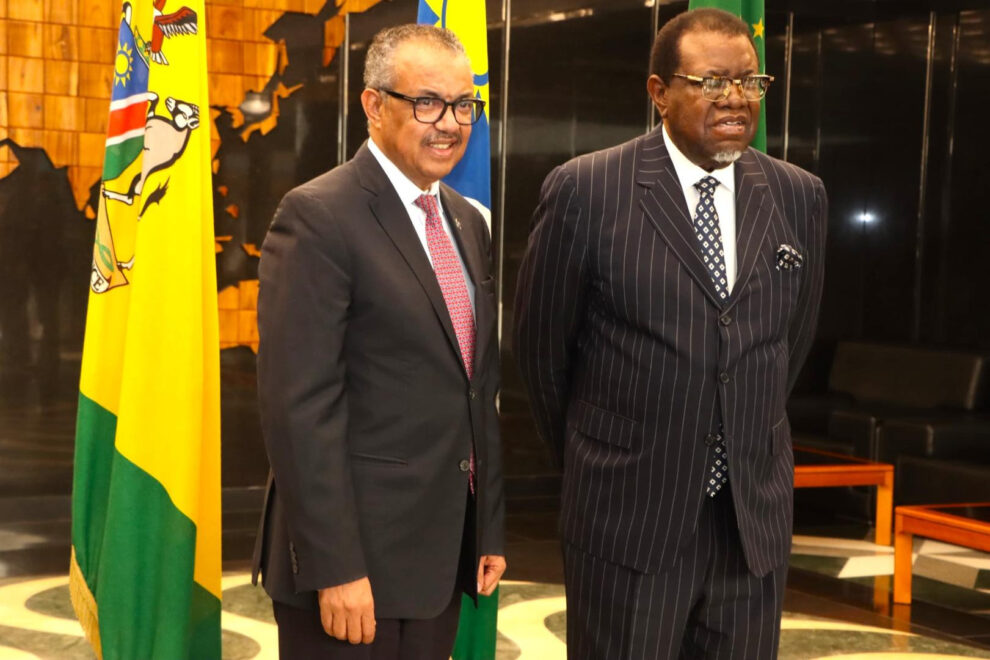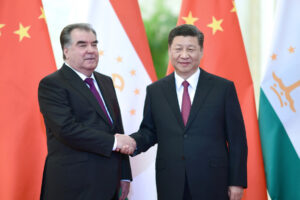The World Health Organization (WHO) Director-General, Dr Tedros Adhanom Ghebreyesus has commended Namibia for its commitment to Universal Health Coverage. “I would like to thank you for your commitment to Universal Health Coverage for all Namibians,” said Dr Tedros during a meeting with Namibia’s President Dr. Hage Geingob. Dr. Tedros noted that in a country like Namibia where the population density is low, and the settlements are sparsely populated, providing services is a challenge. “But the commitment to Universal Health Coverage from your government is very refreshing,” he said, further adding that he would be happy to continue working with Namibia on Universal Health Coverage.
Dr Tedros was on a two-day visit to Namibia on 30-31 August 2023, to strengthen collaboration on public health matters of mutual concern for the WHO and the Government of Namibia, in line with WHO’s strategic priority of achieving universal health coverage for people of all ages. The WHO Director-General also noted that HIV is on the decline in Namibia. Mother to Child-Transmission is also on the decline, noted Dr Tedros further. Malaria is on the decline, he added.
“You have challenges but I’m really glad to see the progress that I see. You’re showing Africa and the world that progress is possible,” he said.
While praising Namibia for its efforts to address the health challenges in the country, Dr Tedros also used the opportunity with the Namibian president to promote continued collaboration with WHO.
Dr Tedros also proposed support for more African members to ratify the Africa Medical Agency (AMA). The objective of establishing AMA is to support the growth of local pharmaceutical production, a key objective of the pharmaceutical manufacturing plan for Africa.
Furthermore, the AMA will play a critical role in catalyzing trade in support of the Africa Continental Free Trade Area and evaluate medical products for the treatment of priority diseases as determined by the African Union.
Also, it will regularly inspect, coordinate and share information and products that are authorized for marketing.
“The Africa Medical Agency is being established in Rwanda. I think strengthening that would also be important, especially on the ratification because only 26 countries have ratified,” the WHO Director-General told the Namibian Head of State. He said AMA will help Africa to improve access to quality drugs and thus having a continental institution like that is important.
Additionally, Dr Tedros was delighted that Namibia is an active participant and leading the way on the proposed Pandemic Accord. WHO member states are negotiating a convention, agreement or other international instrument under the Constitution of the WHO to strengthen pandemic prevention, preparedness and response. “The Pandemic Accord will be very important to learn from the lessons during the pandemic and put solutions in this accord to avoid repeating the same mistakes again. Thank you for your leadership on the pandemic accord,” Dr Tedros told President Geingob. Dr Tedros urged the African continent to unite in support of the negotiation process to ensure Africa’s interests are included in the pandemic accord.
Meanwhile, the Minister of Health and Social Services, Dr Kalumbi Shangula said Namibia has improved its health infrastructure “since the advent of Covid-19”. “We have improved on the health workforce and we are now building on that success to strengthen our health system to be able to cope with any possible health emergencies,” said Dr Shangula. Furthermore, Dr. Shangula informed the WHO Director-General that the Namibian Government recently approved the Ministry of Health and Social Services’ roadmap for strengthening health systems in Namibia.
“We are making good progress. I also want to mention that we have a very good working relationship with the WHO office here in Namibia,” Dr Shangula said.
Source : WHO
















